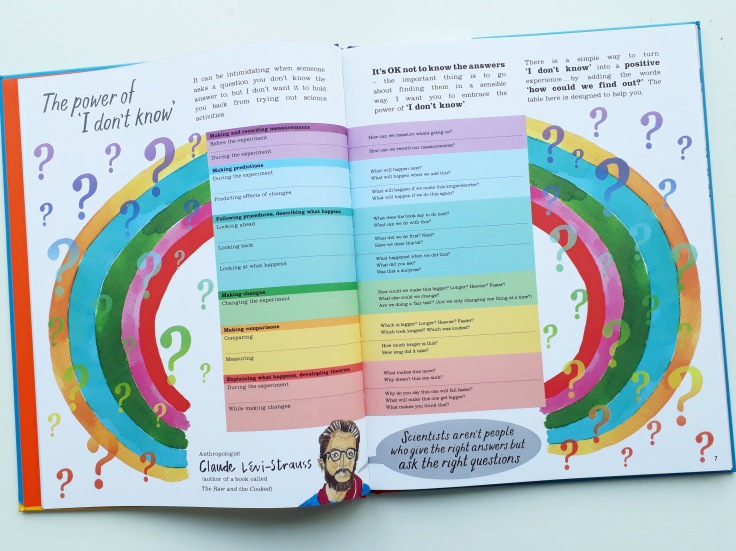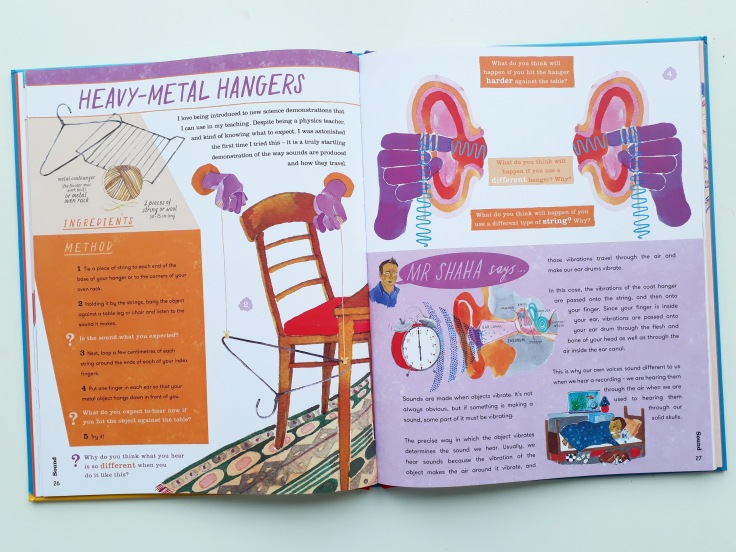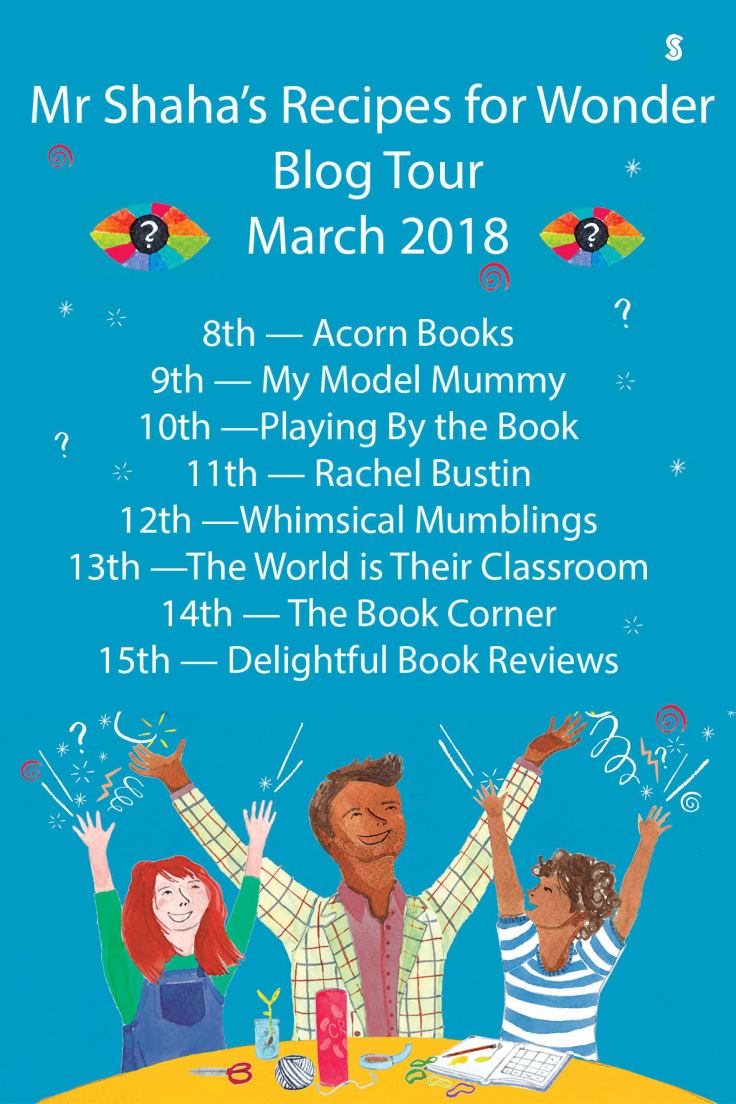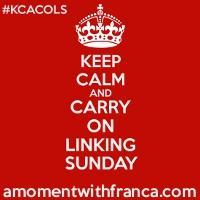Mr Shaha’s Recipes for Wonder is a science book with a difference, written by Alom Shaha, illustrated by Emily Robertson and published by Scribble Kids Books.

Right from the start this book hands readers the key to discovering the world and the wonders of science through asking questions and scientific investigation. With clear explanations of methods of investigation and examples of questions to ask, Shaha’s aim is for children to “embrace the power of I don’t know” and ask the questions that could discover the possible answers. As human beings we can become fixated on wanting to be right or know the answer to questions but Shaha reminds us that in Science “It’s OK not to know the answers.”

Split into 5 sections this book provides easy to follow investigations that can be carried out at home using minimal materials that can be found in most houses. From vitamin-powered rockets and homemade cameras to creating sounds from hangers and building simple motors, each investigation is clearly set out and peppered with questions to encourage the reader to continually think about what is happening and what could happen. What’s great about this is it shows that all of these activities are open ended, there is always the potential to find out more.

Scientific concepts are explained in an accessible way illustrated with charming and colourful images which make for an exciting and engaging read.

It is great to understand and know many of the answers when it comes to science, but the potential for those answers to be questioned again is what makes our knowledge grow. This is what makes science exciting and Alom Shaha has captured it perfectly.
Colour Changing Cabbage

My boys are 5 and 2 and I wanted to choose an activity from the book that they could help with, so we set about conducting some simple chemistry with the help of a red cabbage.
By whizzing up some cabbage leaves and water we were able to turn the water a deep purple. The boys thought this was amazing as we’d immediately created a potion from a vegetable which we then decanted into separate glasses. I lined up lots of things from the kitchen for us to add to the purple potion; fairy liquid, lemon juice, bicarbonate of soda, an egg and vinegar. The boys instantly started guessing what colour the liquid would turn next (amazingly, my two-year-old predicted the first two correctly). You can see our results here and how pronounced the change in colour was.
Even at their young age it was clear to see how amazed my boys were at the results and they started making basic hypotheses about what would happen to other things if we added them to the purple potion. A great activity that has definitely sparked their curiosity and opened up so many more avenues for discovery.
Here’s Alom performing the experiment with a bit more style…

Q&A with Alom Shaha

Developing a curiosity for science in children is something we are really passionate about and we’re delighted to welcome Alom to the blog for a Q&A session about the book and his own adventures in Science.
Can you tell us how the idea for your Recipes for Wonder book came about?
A couple of years ago, I was hired by The Royal Institution to make a video series to help parents do science activities with their children at home. That work eventually led me to write my book. As part of my work at the Royal Institution, I watched a lot of “science experiments at home” videos on YouTube and read a lot of “science activity” books. I noticed that most of these videos and books do the same thing: provide the viewer or reader with instructions for how to recreate exciting phenomena, such as inflating a balloon using baking soda and vinegar, and then provide “scientific” explanations of the phenomena. To me, it seemed these videos and books had a very limited idea of what constitutes doing “science”. I wanted our videos to do more than provide the kind of step-by-step instructions you can find in countless other videos and books: I wanted to equip parents with the skills they need to help their children engage more deeply with scientific ways of thinking. You can see the videos I made at http://www.rigb.org/families/experimental
Having carried out some of the activities from the book with very young children it was great to see them naturally start predicting and asking more questions about what was happening. What advice would you give to early years settings or parents of young children for igniting an interest in science from a young age?
You can ignite an interest in science if you take an interest yourself. In other words, you need to model what you want for your children There are so many wondrous things in the natural world, and just taking the time to stop and look closely can be the first step towards being a scientist.
In the book you talk about a former teacher of yours who inspired you, how important do you think a teacher’s influence is on encouraging a love of science?
I think for a lot of people, teachers are a key influence in what they go on to study. Certainly in my experience, bright young people often choose their A-levels based on whether they like the teachers of particular subjects. When scientists are surveyed about why they chose their particular career, they often cite a good science teacher as their inspiration.
I’m sure many of us can think of individual teachers who have had such a positive impact on us, did you ever go back to tell Mr York what an important role he played and have you had any similar experiences with students in your own role as a teacher?
I’m pleased to report that yes, Mr York is well aware of his influence on me and how grateful I am to him for the way he taught me. I’m also in touch with Mr Cook, my primary school teacher who had a tremendous impact on my early education, and Dr Michael de Podesta, my best lecturer from when I did my Physics degree.
Can you tell us about any of your experiments that have gone wrong and how you learnt from them? (with a disclaimer of not trying them at home of course!)
For my A-level Physics, I had to do my own experimental project without any help from the teacher. I chose to try and investigate the Mpemba effect (link: https://en.wikipedia.org/wiki/Mpemba_effect) in which hot water is supposed to freeze quicker than cold water. After two weeks of trying, I had to conclude that I could not reproduce Mpemba’s findings. I thought my experiment was a failure, but my teacher helped me see that I had learned a lot about how to design an experiment, improvise apparatus, and problem solve from the process.
What are the main messages you hope children and their parents will take from Recipes for Wonder?
Looking at the world scientifically can enrich our lives, even if we don’t want to be “scientists”.
What has been your biggest “wow” moments in your own adventures in science?
The biggest wow moment for me is always when I understand how something works, when the pieces of scientific information and models I’ve learned about fall into place. There is no bigger “wow” than the wow of understanding.
Many thanks to Alom for joining us and answering our questions, you can find out more about Alom and his work on his website here and if you need any more convincing about the book then here’s a handy video with more brilliant experiments.
Buy Mr Shaha’s Recipes for Wonder from Wordery with free delivery.
Be sure to catch up with the rest of the posts in the blog tour this week too.

Many thanks to Scribble Kids Books for sending a copy of this book for review.
Follow @AcornbooksThis post contains affiliate links that won’t change the way you shop but might make us a little bit of money… that we will probably spend on more books.
“>
“>




Oh this looks like so much fun, great book for families!! Thanks for sharing with #readwithme
LikeLike
This sounds a lovely book. I think my boys would love it #readwithme
LikeLike
Your cabbage experiment looks and sounds really fun, it’s great that Alom Shaha has shared experiments that use products that you already have at home.
#ReadWithMe
LikeLike
My daughter is nearly 12 and thinks science is ‘boring’ and difficult. I think she might enjoy this book, it looks very interesting.
LikeLike
I love this idea as it will work for all my kids! #kcacols
LikeLike
I had never heard of this book but it sounds so brilliant! I love the illustrations and the experiment you’ve done here is so fun. Thanks so much for linking up at #kcacols. Hope you come back next time
LikeLike
It’s great and the illustrations are fab, really engaging.
LikeLike
I love the look of this book. It sounds really engaging and something that our 8yo would love. She’s always asking to do experiments or asking sciencey things! #kcacols
LikeLike
It would be perfect for her and so great for parents too as you’ll be able to find most of the things you need in your house already.
LikeLike
Great way to get children engaged with science so it’s a positive for me:)
Mainy
#KCACOLS
LikeLike
Good interview, I really like the look of this book, though my little croc is a little small to appreciate it right now. #kcacols
LikeLike